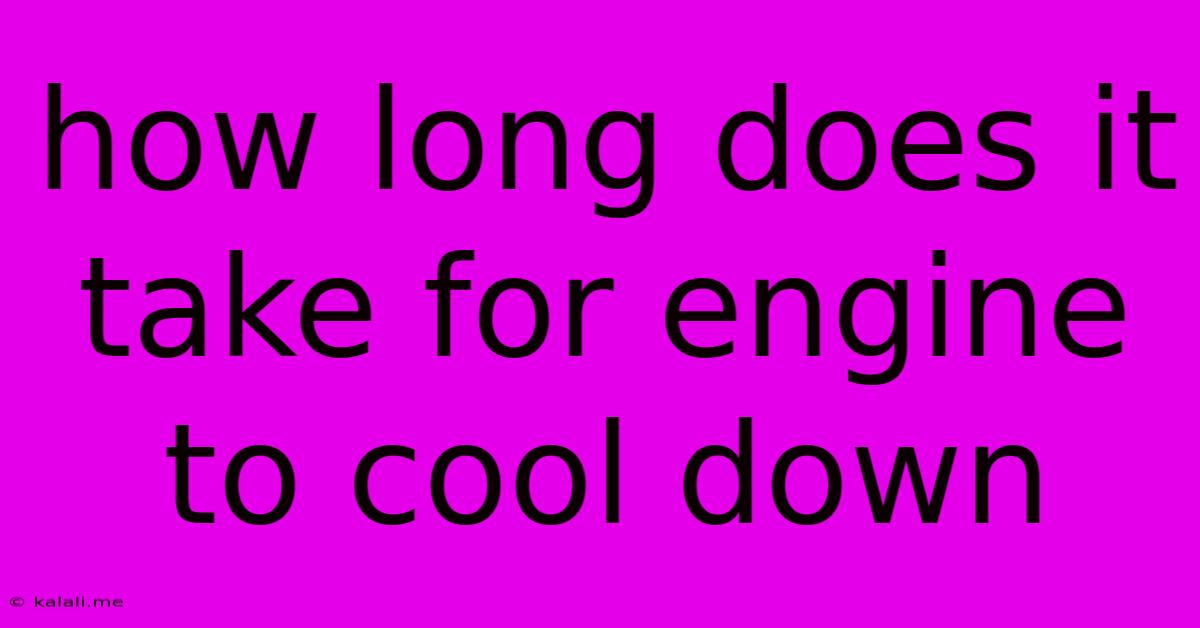How Long Does It Take For Engine To Cool Down
Kalali
May 20, 2025 · 3 min read

Table of Contents
How Long Does It Take for an Engine to Cool Down? A Comprehensive Guide
Knowing how long it takes for your car engine to cool down is crucial for its longevity and your safety. This isn't a simple "one-size-fits-all" answer, as several factors influence the cooling process. This guide explores the variables and provides insights into safe practices.
Factors Affecting Engine Cool-Down Time:
Several factors influence how long your engine takes to cool down. Understanding these will help you make informed decisions about when it's safe to work on your vehicle or leave it parked.
-
Engine Size and Type: Larger engines, particularly V8s and V12s, naturally retain more heat and take longer to cool than smaller, four-cylinder engines. The engine's material (aluminum vs. cast iron) also plays a role, with aluminum typically dissipating heat faster.
-
Ambient Temperature: On a hot summer day, your engine will take considerably longer to cool than on a chilly winter evening. The outside temperature significantly impacts the rate of heat dissipation.
-
Driving Conditions: A strenuous drive, involving high RPMs and heavy loads, will leave your engine significantly hotter than a leisurely commute. This translates to a longer cool-down time.
-
Coolant Type and Condition: The quality and quantity of your coolant are vital. Old, degraded coolant will transfer heat less efficiently, prolonging the cooling process. A low coolant level also hampers effective cooling.
-
Vehicle Features: Some vehicles have features designed to expedite cooling, such as enhanced cooling fans or specialized cooling systems. These features can reduce the overall cool-down time.
Average Cool-Down Times:
While it’s impossible to provide an exact timeframe, here's a general guideline:
-
Under normal driving conditions: Expect your engine to take at least 30-60 minutes to cool down sufficiently.
-
After strenuous driving: Allow at least 60-90 minutes, or even longer, for the engine to cool completely.
-
In extreme heat: Consider waiting over 90 minutes for the engine to reach a safe operating temperature.
Why You Shouldn't Rush the Cooling Process:
Rushing the cool-down process can lead to several problems:
-
Damage to Engine Components: Hot engine components are more susceptible to damage from rapid temperature changes. This can lead to warping, cracking, or premature wear.
-
Burns: Touching hot engine parts can cause severe burns. Always wait for the engine to cool down completely before attempting any maintenance or repairs.
-
Reduced Engine Lifespan: Repeatedly stressing the engine with rapid temperature fluctuations can significantly reduce its overall lifespan.
Safe Practices for Engine Cooling:
- Always allow sufficient time for the engine to cool down. Don't rush the process.
- Check your coolant level regularly. Ensure it's within the recommended range.
- Perform regular maintenance on your cooling system, including coolant flushes and inspections of hoses and belts.
- Be cautious when working near a hot engine. Wear appropriate safety gear, including gloves and eye protection.
Conclusion:
The time it takes for your engine to cool down is variable, depending on several factors. Prioritizing safety and allowing adequate time for cooling is crucial for maintaining your vehicle's health and avoiding potential problems. Err on the side of caution; it's always better to wait longer than to risk damaging your engine or injuring yourself. Remember to always consult your owner's manual for specific recommendations related to your vehicle's cooling system.
Latest Posts
Latest Posts
-
Can I Put Water In My Coolant Tank
May 20, 2025
-
Can Stainless Steel Go Into Oven
May 20, 2025
-
How Many Breaks For 9 Hour Shift
May 20, 2025
-
How Do I Stop Birds From Hitting My Windows
May 20, 2025
-
Can You Use Induction Pots On Gas
May 20, 2025
Related Post
Thank you for visiting our website which covers about How Long Does It Take For Engine To Cool Down . We hope the information provided has been useful to you. Feel free to contact us if you have any questions or need further assistance. See you next time and don't miss to bookmark.